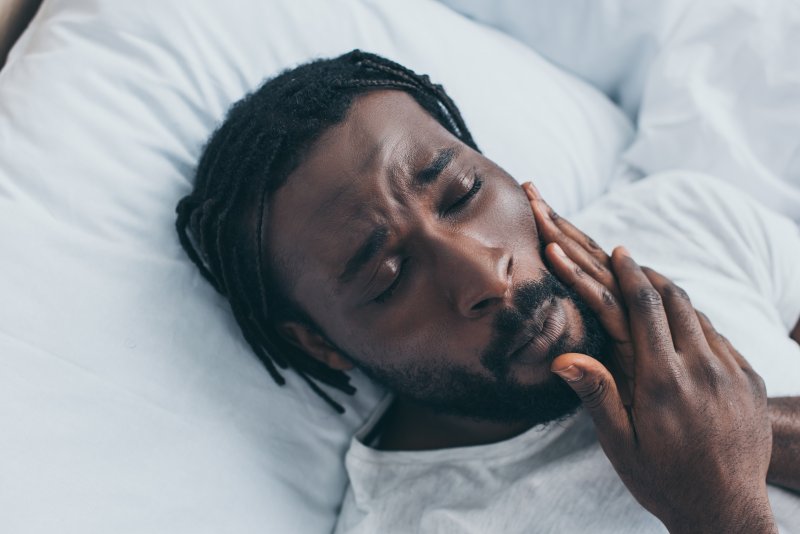
If you’ve been suffering from chronic jaw pain, headaches, and other painful symptoms of a TMJ disorder, you need to start asking important questions about your health – including, surprisingly, “How well am I sleeping?” Roughly 43% of patients with TMJ disorder also tend to have issues sleeping, with sleep apnea being particularly common. Could your jaw pain have something to do with sleep-disordered breathing? Below, you’ll discover the hidden connection between TMJ and sleep apnea.
TMJ Disorders and Sleep Apnea: What’s the Connection?
During obstructive sleep apnea (the most common form of sleep apnea), the tissues in your mouth and throat collapse and block your airway. Interruptions in your breathing affect your body in numerous ways, but one response that might go overlooked is that the lower jaw is automatically moved forward. Since sleep apnea episodes can happen multiple times every hour, the constant motion of the jaw could put a lot of strain on the temporomandibular joint (TMJ). As a result, sleep apnea could lead to a TMJ disorder, or it might make existing jaw pain worse.
Furthermore, sometimes TMJ disorders and sleep apnea overlap because they share similar risk factors. For example, a misaligned jaw could prevent the airway from staying open while you sleep while also putting undue pressure on the jaw joints. Both conditions are also sometimes associated with chronic fatigue syndrome, which is a disorder characterized by extreme fatigue that doesn’t seem to be due to any other underlying medical condition and does not improve with rest. In general, the cause of your TMJ disorder could be very close to the cause for your sleep apnea.
How Can You Improve TMJ Pain and Sleep Quality?
TMJ disorders sometimes go away on their own while sleep apnea does not. In either case, though, it’s best to seek treatment as soon as possible. The sooner you act, the sooner you can relieve your TMJ pain and get better rest at night.
Both conditions can potentially be treated with oral appliances. An oral splint for a TMJ disorder will move the jaw slightly forward, allowing the joint to reach a more comfortable resting place. Repositioning the jaw this way also helps keep the airway clear and can reduce harmful sleep apnea symptoms.
There are other ways to treat these disorders as well. Gently massaging and stretching your jaw joints can go a long way towards lessening the discomfort caused by a TMJ disorder. Sleeping on your side instead of your back and losing weight could make your sleep apnea less severe.
You can’t get the most out of life if you’re exhausted and constantly in pain. Make an appointment with your dentist today to start exploring potential solutions for TMJ discomfort and sleep-disordered breathing!
About the Author
Dr. Mitch Conditt has personally experienced the difference that custom oral appliance therapy can make for someone with sleep apnea. Today, he is dedicated to using his 35 years of dental experience to help Fort Worth patients overcome jaw pain as well as improve sleep disorders. He can diagnose the cause of a TMJ disorder and offers a sleep quiz that can help determine whether you’re at risk for sleep apnea. To schedule a consultation, visit his website or call (817) 527-8500.
